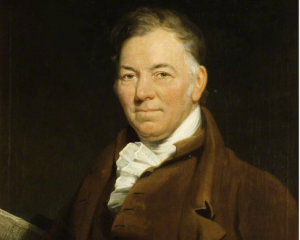In 1769, the year that Oliver Goldsmith was writing his poem, a military officer with a social conscience, Philip Thicknesse, published a horrifying account of four persons starved to death in a poorhouse at Datchworth.
就在1769年,奧利弗·哥德史密斯寫詩那年,菲利普·西克尼斯,一位有社會道德的軍官,發表了一篇令人震驚的文章,記述了在達茨沃斯救濟院四個人被活活餓死。
To most complacent Britons, this was supposed to happen in rat-infested corners of the continent, not in Hertfordshire.
大多數自得意滿的英國人還以為只有在歐洲大陸那些鼠患猖獗的窮鄉僻壤才會如此,赫特福德郡絕無可能。
For those who had eyes to see beyond the railings of their parklands, two painful questions presented themselves about the real state of the British countryside.
那些不固步自封、愿意踏出自己莊園的人,就能看到英國鄉村正面臨著兩個非常棘手的問題。
What was to be done and who was to blame? Was it the responsibility of the Church?
現狀該誰負責,又該如何治理?這是教會的責任嗎?
Had the Church grown too fat, too respectable, too indifferent to its duties towards the unfortunate?
是教會發展的過于龐大,身價過高,對不幸之人無動于衷,不盡職盡責了嗎?
Or was it a matter for the absentee land-owning gentry, whose estates were being run by hard-nosed men with an eye to bottom-line profit?
還是要怪那些常年不在的地主們放任那些鐵石心腸、只顧利益的人來管理產業?
Or was it wrong to think in terms of what had once been?
我們惦念昨日的輝煌是對是錯?
Was that just applying a coat of whitewash to a building that was fundamentally rotten from top to bottom? Was the answer not charity, but politics?
要維護舊習是否只是在粉飾一座無可救藥的建筑?也許鄉村的出路不在慈善,而在政治改革?
Thomas Bewick certainly thought so. As a child outside Newcastle, he didn't need Rousseau to tell him about the freedom of fresh air.
托馬斯·比威克顯然這么認為。在紐卡斯爾長大的他不用等盧梭來教育他,也自會跑去自然中盡情玩耍。
Bewick had played truant from school, and instead of filling his slate with improving knowledge, he'd filled it compulsively with drawings,
比威克經常逃學,而比起利用逃學時間增長知識,他更愿意把這時間全部獻給繪畫,
finding his way instinctively towards his vocation as the first great illustrator of British natural history.
幾乎本能地踏上了他日后的職業道路,成為英國首位著名的自然歷史插畫家。
What's more, Bewick's pictures weren't just meant for a gentleman's library.
更重要的是,比威克的插畫并不僅僅是畫給紳士們的。
Ordinary people wanted a little book packed with images of the birds and animals of the British Isles.
平民百姓也會想要一本畫滿了不列顛群島飛鳥走獸的小冊子。
But Bewick was looking at something else, too.
但比威克也著眼于其他事物。
Snuggled between the plover and a waxwing was a portrait of his world, rain-soaked Northumberland, a tough, dark, gritty place, a world in a lot of pain.
參雜在珩鳥和連雀之中的是他個人世界的寫照,陰雨綿綿的諾森伯蘭,是一個環境艱苦、陰暗、多沙、苦難深重之地。
In his churchyards, dogs snarl. By his roadsides, poor bastards break rocks. In his garrets, blind old paupers slurp soup.
教堂庭院里有吠犬。路邊有窮人在敲石塊。閣樓里又老又聾的乞丐喝著湯。

All this made Thomas Bewick very angry. All this made Thomas Bewick a radical.
這些都令托馬斯·比威克非常憤怒。促成他成為一個激進者。
In Newcastle, he mixed in debating clubs with men like himself, educated artisans, tradesmen and professionals passionate in their devotion to liberty.
他在紐卡斯爾加入志同道合的辯論協會,成員均為受過良好教育的工匠、商人和專家,熱衷于為自由獻身。
It is by the good conduct and consequent character of the great mass of the people that a nation is exalted.
正是這一大批人的良好行為和理性品格讓這個民族備受尊崇。
And what fired Bewick's radicalism wasn't just anger.
點燃比威克激進思想的不只是怒火。
It was an emotion new to politics -- sympathy, what moved him was an overwhelming feeling for the victims of injustice, poverty and suffering; a recognition that deep down, we are all bonded by our shared human nature.
還有政治上的一種新情緒,同情,打動他的是對受到不公正待遇、貧窮、苦難者的強烈同情,他意識到在內心深處我們都被賦予了共同的天性。
It was a call to action echoed in pulpits up and down the country.
號召人們為之行動的聲音響徹了國內的每一間教堂。
How could you feel the suffering of the others and not want to do all in your power to remedy it?
你都感受到了他人的苦痛,怎么能不盡全力去補救呢?
For the first time, there was a politics of suffering, one that could no longer turn a blind eye to the plight of children, the aged, the sick and the poor.
這是第一個為苦難而發起的政治活動,沒人可以再視而不見那些困苦的兒童、老人、病患和窮人。
Yet bigwigs did turn a blind eye. They believed that the Glorious Revolution of 1688 had sent James II and his Catholic despotism packing, and given birth to a land of the free.
然而權貴們卻真的視而不見。他們相信1688年光榮革命已經推翻了詹姆斯二世和天主教專制,創造了一片自由的國土。
In 1788, with a 100th anniversary upon them, how tempting it was to continue patting themselves on the back as being the most enlightened country in the world.
在1788年,革命一百周年之際,繼續自吹自擂英國是世上最開明國家又是多么有誘惑力。
But for the likes of Bewick and his friends, there was nothing to be complacent about.
但對于比威克和他的朋友們來說,沒什么可以沾沾自喜的。
The real problem of the Glorious Revolution, the radicals argued, was its hijacking by scoundrels who'd perverted it to satisfy their own greed and ambition.
激進分子們認為光榮革命真正的問題是革命成果被一群無賴劫持,為了自己的貪婪和野心把國家引入歧途。
They packed parliament with sycophants placement and they sold their vote to pay their tailor's bill.
議會里充滿了逢迎拍馬之輩,出賣自己的選票,只為奢侈華服。
The real forgotten lesson of 1688 was that the people were entitled to resist, entitled to change their government, entitled the kind of sovereign that understood the reality of a limited monarchy.
他們忘了1688年真正的教訓,人民有權反抗,有權撤換政府,有權選擇真正懂得君主立憲制含義的君主。












